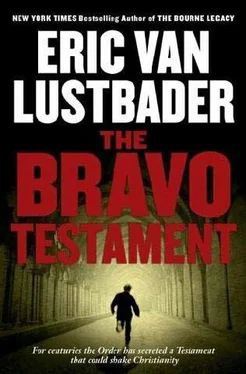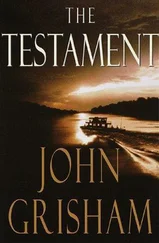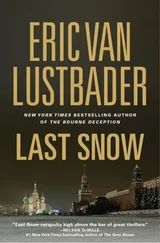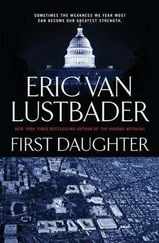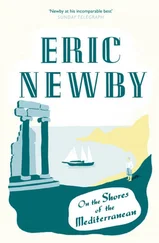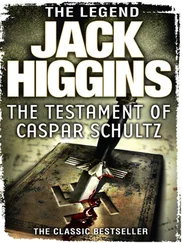Bravo moved silently toward him. At this hour there was virtually no one else in the museum. Watery light filtered in through windows high up in the walls, casting cubes of pallid light, waking the icons from their long slumber.
Though Bravo spoke the priest's name under his breath, Father Damaskinos started as if pinpricked. He whirled, his eyes showing whites all around. He was clearly terrified.
"Bravo," he said, "you're alive, God be praised! I was so afraid-I didn't see-"
"It was a fiasco, Father. A complete disaster. Uncle Tony was killed, shot to death by…" He shook his head. His chest hurt as if it had been he, not Uncle Tony, who'd been shot. He wanted to scream until his throat bled. "Traitors. I've got to get away from the traitors."
"Yes, I understand." But Father Damaskinos seemed preoccupied, and he looked furtively around, as if at any moment he expected someone to burst through the museum doors. He had a pale, hunted look.
"But I must take Lorenzo Fornarini's dagger with me," Bravo went on quickly. He had his own terrors to deal with. "Father, I can do that if you write a letter affirming it as a religious antiquity being repatriated to Turkey."
"That is where you're going?"
"Yes, to Trabzon."
The priest nodded, but in a vague, preoccupied way that caused Bravo to speak his name once again.
The priest started, staring at Bravo as if he were an apparition.
"Father, what is it?"
Father Damaskinos's eyes snapped into focus. "Yes, yes, I will do as you ask, of course. But-"
Bravo looked at him enquiringly. "Yes, Father?"
For a moment, something dark appeared to pass before the priest's eyes, then like a cloud it was gone. "Nothing."
"Father, you did the right thing."
"What?" The one word escaped his lips like a gasp. It seemed his terror had tightened another notch.
"The gun, Father. Giving the gun to Uncle Tony."
"I don't know. God will forgive me, but I don't know…"Father Damaskinos put his hand on Bravo's shoulder and with an effort pulled himself together. "Just be careful, my son. Be very careful. You're up against… the most dangerous opponent."
Bravo's brow furrowed and he shook his head.
Father Damaskinos wiped his lips free of the spittle that had formed there. "It's the devil, you see," he said with a soft exhalation of sour breath. "The devil has entered the field of battle."
At the Trabzon airport, where Bravo stood waiting for the suitcase into which he'd packed the dagger, the air was filled with a blinding hail of Turkish and Arabic, falling on his ears like soft hammer blows, like someone chopping cabbage, like the ten million grains of a sandstorm. He eavesdropped on nearby conversations, attuning his ear to the harsh, rapid-fire music of the East. He hadn't heard Turkish spoken in some time, and as he thought of answers to questions posed by the men, women and children crowding around him at the baggage carousel, he spoke them in Turkish and Arabic under his breath.
He snatched his bag off the carousel and took it into a stall in the men's room. After assuring himself that the dagger lay undisturbed just as he had packed it, he washed his face and hands. Looking up into the stained mirror, he wondered who was staring back at him. A death's-head, it appeared, as haunted-looking as Father Damaskinos in the Scuola San Nicolo`. He turned away, a bit frightened by what had happened to him, what he was becoming.
Back in the crowded, echoing terminal, he took a long, lingering look around with what he felt was a thoroughly justified knife-edge of paranoia. No one appeared to be paying him the slightest attention. With his bag clutched in one hand, he went out into the humid night.
He took a wheezing, skeletal taxi into the city, which was built on a steeply sloped shelf of rock that rose from the scimitar harbor front up into the foothills of the hazy blue and ocher mountains that for centuries had acted as a miraculous natural barrier against a landward invasion. As Trebizond, the city had been tucked securely behind thick walls, modeled after those that protected Constantinople.
Looking upward into the dark heart of the lamp-lit mountains, Bravo could feel the shape, the weight of Trabzon's history. When Constantinople fell to European armies in 1204 as a result of the Fourth Crusade, three smaller Greek empires emerged from the wreckage: Nicaea, Epirus, and Trebizond. Alexius I, a grandson of the Byzantine emperor Andronicus I Comnenos, made Trebizond the seat of the grandest and richest of the three. What the Comneni emperors understood the moment they and their army landed at Trebizond was the city's almost magical location. Situated at the beginning of the road that connects the southern Black Sea coast to Iran, as well as sitting at the gateway to the Zigana Pass through Erzurum and thence into the interior of Anatolia, its strategic importance could not be overstated. Thus the Comneni became the architects of Trebizond as a major East-West trading nexus, where Christianity met-and, during the fourteenth and fifteenth centuries, famously clashed with-Islam, for Trebizond was intensely coveted by the Greeks, who developed "the Fortunate City," the Latins, who traded through it, and the Ottomans, who considered it stolen from under their noses.
Through the cleft in the dark mountains he imagined the long, jangling train of tawny-gray camels snaking into the city through the narrow, well-defended valley of the Pyxitis, bringing untold riches to the anxiously waiting merchants and entrepreneurs of Venice, Florence, Genoa, as well as the Vatican, for in its day Trebizond had been home to many a warrior-priest.
The rattletrap taxi dropped him at the Zorlu Harbor Hotel, where he had booked a room overlooking the placid Black Sea. The night itself was inky with low-hanging clouds, starless, moonless. The unseen cries in Turkish and Arabic mingled with the desperate barking of the lean street dogs. Outside his window, boats slid past as if across a theater stage. He unlocked the glass door and went out onto the balcony, stood at the edge, inhaled the exotic scents of sumac and myrrh, turmeric and mint, absorbed the strange cacophony of the city. From an open doorway of a seaside club, the trill of Turkish music, the authoritative strum of oud and balzouki. The staccato bass of diesel trucks, the hyperventilating percussion of the motor scooters. Then could be heard the alto and tenor voices. In the ululations, the rise-and-fall toccata of the languages, he could hear hints of Venetian arias, Byzantine twists brought westward across the watery divide by caliphs and sultans, terrifying Seljuks and Mamalukes. He heard what might have been a call to prayer and lifted his head. The black leviathan of an oil tanker was lumbering west. Across the sea lay Ukraine, a country more foreign even than this one.
He ate a meal of dorade grilled with olive oil and mint beneath a shower of charred oregano. He turned the white flesh inside out, away from the translucent infrastructure of the skeleton, a grid of mathematical ingenuity. Wouldn't it be marvelous, he thought, to create a cipher based on such an organic grid.
He slept then, though he hadn't meant to, sprawled diagonally on the bedspread, his rumpled clothes still on, the remnants of dinner piled on the white linen-covered cart.
In his sleep, he dreamed, and in his dream his father came to him once again. His father in his bath, the water rushing in, the steam rising, Dexter's head thrown back, his wet hair slicked away from his broad forehead. His father at his ease, but not vulnerable, never vulnerable.
He had shaved once while his father was in his bath.
"I suppose you've read all the news dispatches from Somalia," Dexter had said in a matter-of-fact tone.
Читать дальше
